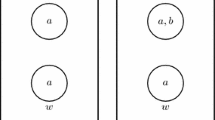Conclusion
The logics of the modal operators and of the quantifiers show striking analogies. The analogies are so extensive that, when a special class of entities (possible worlds) is postulated, natural and non-arbitrary translation procedures can be defined from the language with the modal operators into a purely quantificational one, under which the necessity and possibility operators translate into universal and existential quantifiers. In view of this I would be willing to classify the modal operators as ‘disguised’ quantifiers, and I think that wholehearted acceptance of modal language should be considered to carry ontological commitment to something like possible worlds
Considered as two languages for describing the same subject matter, modal and purely quantificational languages show interesting differences. The operator variables of the purely quantificational languages give them more power than the modal languages, but at least some of the functions performed by the apparatus of operator variables are also performed, in a more primitive and less versatile way, by actuality operators in modal languages.
A final note. Quine has written much on the inter-relations of quantifiers, identity, and the concept of existence. These, he holds, form a tightly knit conceptual system which has been evolved to a high point of perfection, but which might conceivably change yet further.29 He has also dropped hints about the possibility of a simpler, primitive or defective version of the system, in which the quantifiers are not backed up in their accustomed way by the concept of identity. He has dubbed the resulting concept a ‘pre-individuative’ concept of existence, or a concept of ‘entity without identity.’ What would a pre-individuative concept of existence be like? Quine has sometimes suggested that one might be embodied in the use of mass nouns, but the identity concept is used in connection with stuff as well as with things: “is that the same coffee that was in the cup last night?” I would submit that modality provides a better case. In view of the comparative weakness of modal languages, compared to the explicitly quantificational ones Quine takes as canonical, there is surely a sense in which the concept of existence embodied in that disguised existential quantifier, the possibility operator, is a defective one. And as we have seen, one of the differences between modal operators and explicit quantifiers is that modal operators cannot be joined with the identity predicate in the way quantifiers with operator variables can. Surely, then, there is a sense in which ordinary speech, as opposed to the metaphysical theorizing of a Leibniz or a David Lewis, conceives of possible worlds as entities without identity.
Similar content being viewed by others
Author information
Authors and Affiliations
Additional information
As should become obvious on reading it, this paper is inspired by the work of David Lewis, particularly his classic ‘Counterpart Theory and Quantified Modal Logic,’ Journal of Philosophy 7, March 1968. I would like to thank Lewis and the referee for this journal for encouragement and advice. An earlier version of the paper was formulated in terms of Lewis's counterpart theory rather than in terms of individuals being in more than one world, but, since I considered only the case in which the counterpart relation was an equivalence, I Felt that the added complexity was not justified. Doing things in a counterpart-theoretic framework does produce two new classes of sentences of the non-modal language which lack translations in the modal: speaking of the properties individuals have simpliciter rather than of those they have at a world allows us to discuss relations obtaining between individuals in different worlds (e.g. the longer than relation obtaining between actual yachts and their counterparts), and the assumption that no individual is in more than one world allows a tricky way of asserting that there are at most n worlds without using the identity predicate between terms for worlds. Otherwise, given the assumption that the counterpart relation was an equivalence with at most one member of each equivalence class being in each world, the transition from the counterpart theoretic framework to the current one was perfectly straightforward.
Rights and permissions
About this article
Cite this article
Hazen, A. Expressive completeness in modal language. J Philos Logic 5, 25–46 (1976). https://doi.org/10.1007/BF00263656
Issue Date:
DOI: https://doi.org/10.1007/BF00263656




